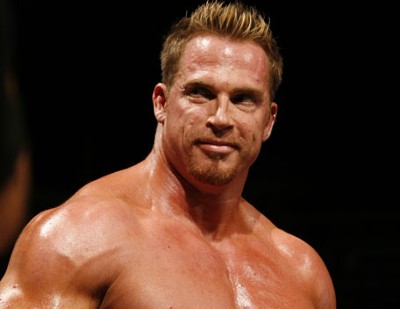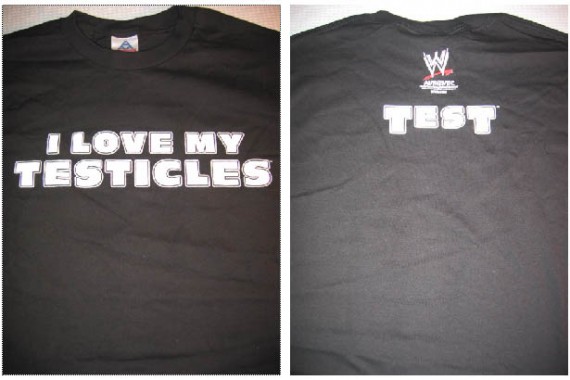
Former WWE pro wrestler Andrew “Test” Martin was found dead at the age of 33 in his Tampa residence during a police welfare check on March 13, 2009. The cause of death has not been determined but foul play is not suspected. The Tampa Police Department has requested toxicology tests after discovering large amounts of prescription painkillers and anabolic steroids in his Post Harbour Place condominium. Martin was apparently notorious for his use of steroids and sometimes faced fans who chanted accusations of steroid use; Martin defended steroid use for cosmetic purposes as similar to Botox or a facelift. His WWE nickname “Test” is coincidentally slang for testosterone and his fans were affectionately called his Test-icles (“Friend Of ‘Test’ In Shock Over Pro Wrestler’s Death,” March 17).
Prescription drugs including painkillers and steroids were found in Martin’s home, Tampa police spokeswoman Laura McElroy said today.
“We’re awaiting the toxicology report to determine if any of those painkillers and steroids played a role in his death,” McElroy said.
“He was obviously very healthy. The mystery of his death will likely come out in his toxicology report.”
The tragic culture of professional wrestling that involves the use of anabolic steroids, prescription painkillers, muscle relaxants, and alcohol has seen numerous young stars die prematurely. The general public has rushed to identify anabolic steroids as responsible for the death of Andrew J. Martin. The predetermined conclusion that steroids were the culprit the death of Andrew “Test” Martin will undoubtedly persist regardless of the official and actual cause of death.
Representative Henry Waxman isolated anabolic steroids as “the” problem when calling a congressional investigation to examine the steroids in professional wrestling. The unfortunate consequence of such contemporary steroid hysteria is that, in the rush to blame anabolic steroids as the single cause of death, the most significant risk factors are predictably overlooked.
Andrew “Test” Martin had been battling addiction to painkillers that developed after his spinal fusion surgery in July 2004. His struggles with narcotic addiction were well-known among friends and colleagues, professionally and personally.
Eric Bischoff, of Total Nonstop Action wrestling, remember how the addiction changed the behavior of Martin (“Bischoff, Nash comment on Test,” March 14).
“Being only 33 years old, it’s another unfortunate incident. He obviously had challenges with addiction.
“We were friendly, (but) he had a different group of friends as we had an age difference. I did spend a fair amount of time with him (overseas trips, etc.). He was always first-class, very cordial and a polite, professional guy.
“I never saw any evidence of substance abuse until about a year and a half ago. All the time before that he was always sober and professional.”
Kevin Nash, a close friends, noted Martin’s problems with addiction and expressed fears that prescription painkillers could have been responsible.
“We were really close. I helped him get into rehab. WWE picked up the dollar and helped him through rehab. Andrew went in. He was doing really well, making his meetings.
“He went over and worked in Japan (recently). He was in that not as busy as you once were routine. We don’t know the cause of death, and I would hate to speculate.
“The combination of muscle relaxers and pain pills are lethal.
Jim “J.R.” Ross, the professional wrestling commentator and “voice of the WWE”, discussed Andrew Martin’s personal issues that led him to several weeks WWE-funded treatment at the Hanley Center substance abuse clinic in West Palm Beach in August 2008 (“J.R. Remembers Andrew “Test” Martin Who Was Found Dead Friday Evening,” March 14).
Late last summer, reacting on the suggestion of others, WWE reached out to Andrew to ask if he needed some help handling some alleged personal issues that he was rumored to have been experiencing. Andrew had been gone from WWE for over two years but had remained friends with many still associated with WWE. The rumors of Andrew’s issues were true and he was afforded the opportunity by WWE to attend The Hanley Center Rehabilitation facility in West Palm Beach, Florida for several weeks beginning in August of 2008. Andrew successfully completed the WWE funded program and was highly regarded by the Hanley Center with being such an asset to them after completing the program of which Andrew took seriously, according to the facility. Since being released from the facility after successfully completing the program, Andrew had been doing well in his 12 Step AA program and was in contact with WWE with regular phone calls.
Andrew Martin also experienced legal problems arising from driving under the influence. He was arrested and jailed for a DUI on September 14, 2007 and April 5, 2009 in Hillsborough and Pasco counties, respectively.
Andrew Martin addressed the spate of premature deaths afflicting professional wrestlers in an interview he did for an upcoming documentary film about pro wrestling entitled “The Circus” (“Steroids, painkillers found in wrestler’s home,” March 17).
In an eerie twist, Martin openly discussed rampant drug use in a documentary on the epidemic of young deaths in the wrestling world. His message was posted on YouTube one day after his death. The author posted it as a tribute. “I just turned 32-years-old and went to eight funerals. As bad as it may sound, it made me open my eyes and take my foot out the grave. I don’t want to join that club. Either you clean up and straighten up, or lay down beside them,” Martin said.
Several pro wrestlers have died from accidental drug overdoses or suicides including Eddie Guerrero, Chris Benoit, Scott ‘Bam Bam’ Bigelow, Mike “Awesome” Alfonso, Brian Adams, Curt “Mr. Perfect” Henning. The public has linked these wrestlers tragic deaths with anabolic steroids regardless of the strength of the evidence supporting such an association.
[embedplusvideo height=”455″ width=”570″ standard=”http://www.youtube.com/v/rBdDKwqa8ZI?fs=1″ vars=”ytid=rBdDKwqa8ZI&width=570&height=455&start=&stop=&rs=w&hd=0&autoplay=0&react=1&chapters=¬es=” id=”ep4305″ /]

About the author
Millard writes about anabolic steroids and performance enhancing drugs and their use and impact in sport and society. He discusses the medical and non-medical uses of anabolic-androgenic steroids while advocating a harm reduction approach to steroid education.

Leave a Reply
You must be logged in to post a comment.